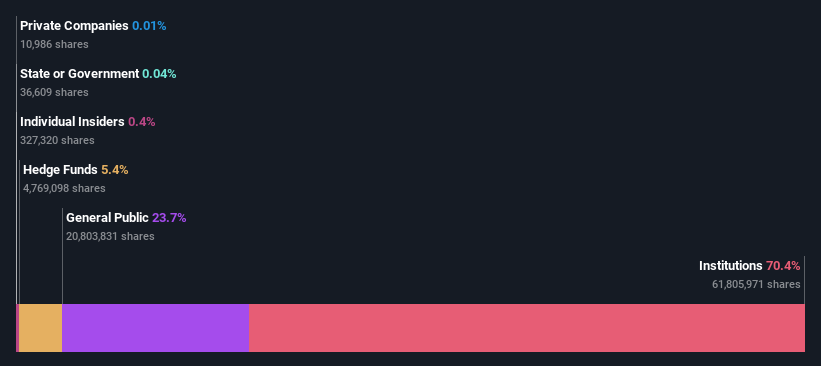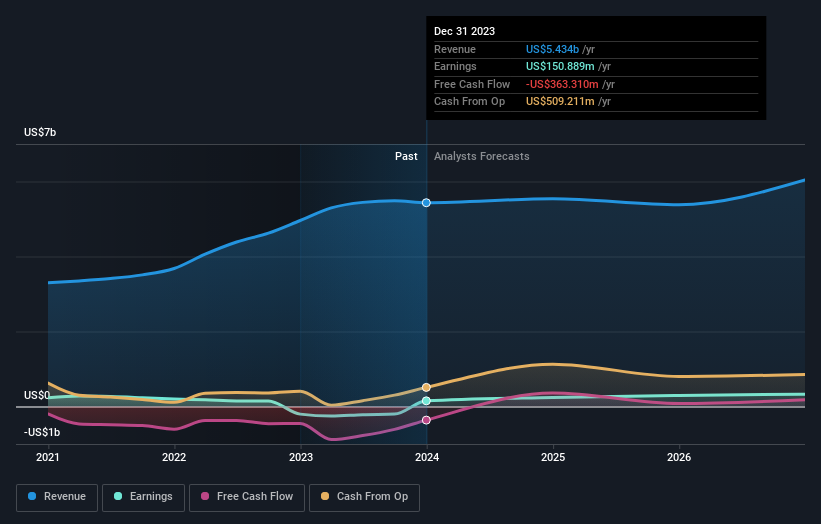Institutional investors control 70% of Southwest Gas Holdings, Inc. (NYSE:SWX) and were rewarded last week after stock increased 3.8%
Key Insights
Significantly high institutional ownership implies Southwest Gas Holdings' stock price is sensitive to their trading actions
50% of the business is held by the top 11 shareholders
Ownership research, combined with past performance data can help provide a good understanding of opportunities in a stock
Every investor in Southwest Gas Holdings, Inc. (NYSE:SWX) should be aware of the most powerful shareholder groups. With 70% stake, institutions possess the maximum shares in the company. Put another way, the group faces the maximum upside potential (or downside risk).
And last week, institutional investors ended up benefitting the most after the company hit US$5.4b in market cap. The gains from last week would have further boosted the one-year return to shareholders which currently stand at 41%.
Let's delve deeper into each type of owner of Southwest Gas Holdings, beginning with the chart below.
See our latest analysis for Southwest Gas Holdings
What Does The Institutional Ownership Tell Us About Southwest Gas Holdings?
Institutions typically measure themselves against a benchmark when reporting to their own investors, so they often become more enthusiastic about a stock once it's included in a major index. We would expect most companies to have some institutions on the register, especially if they are growing.
We can see that Southwest Gas Holdings does have institutional investors; and they hold a good portion of the company's stock. This suggests some credibility amongst professional investors. But we can't rely on that fact alone since institutions make bad investments sometimes, just like everyone does. If multiple institutions change their view on a stock at the same time, you could see the share price drop fast. It's therefore worth looking at Southwest Gas Holdings' earnings history below. Of course, the future is what really matters.
Since institutional investors own more than half the issued stock, the board will likely have to pay attention to their preferences. It looks like hedge funds own 5.4% of Southwest Gas Holdings shares. That worth noting, since hedge funds are often quite active investors, who may try to influence management. Many want to see value creation (and a higher share price) in the short term or medium term. The company's largest shareholder is Icahn Capital LP, with ownership of 13%. Meanwhile, the second and third largest shareholders, hold 11% and 8.3%, of the shares outstanding, respectively.
After doing some more digging, we found that the top 11 have the combined ownership of 50% in the company, suggesting that no single shareholder has significant control over the company.
While studying institutional ownership for a company can add value to your research, it is also a good practice to research analyst recommendations to get a deeper understand of a stock's expected performance. There is some analyst coverage of the stock, but it could still become more well known, with time.
Insider Ownership Of Southwest Gas Holdings
The definition of an insider can differ slightly between different countries, but members of the board of directors always count. Company management run the business, but the CEO will answer to the board, even if he or she is a member of it.
Insider ownership is positive when it signals leadership are thinking like the true owners of the company. However, high insider ownership can also give immense power to a small group within the company. This can be negative in some circumstances.
Our information suggests that Southwest Gas Holdings, Inc. insiders own under 1% of the company. Keep in mind that it's a big company, and the insiders own US$20m worth of shares. The absolute value might be more important than the proportional share. It is good to see board members owning shares, but it might be worth checking if those insiders have been buying.
General Public Ownership
The general public-- including retail investors -- own 24% stake in the company, and hence can't easily be ignored. This size of ownership, while considerable, may not be enough to change company policy if the decision is not in sync with other large shareholders.
Next Steps:
It's always worth thinking about the different groups who own shares in a company. But to understand Southwest Gas Holdings better, we need to consider many other factors. Be aware that Southwest Gas Holdings is showing 3 warning signs in our investment analysis , and 2 of those are a bit unpleasant...
If you are like me, you may want to think about whether this company will grow or shrink. Luckily, you can check this free report showing analyst forecasts for its future.
NB: Figures in this article are calculated using data from the last twelve months, which refer to the 12-month period ending on the last date of the month the financial statement is dated. This may not be consistent with full year annual report figures.
Have feedback on this article? Concerned about the content? Get in touch with us directly. Alternatively, email editorial-team (at) simplywallst.com.
This article by Simply Wall St is general in nature. We provide commentary based on historical data and analyst forecasts only using an unbiased methodology and our articles are not intended to be financial advice. It does not constitute a recommendation to buy or sell any stock, and does not take account of your objectives, or your financial situation. We aim to bring you long-term focused analysis driven by fundamental data. Note that our analysis may not factor in the latest price-sensitive company announcements or qualitative material. Simply Wall St has no position in any stocks mentioned.

 Yahoo Finance
Yahoo Finance 

